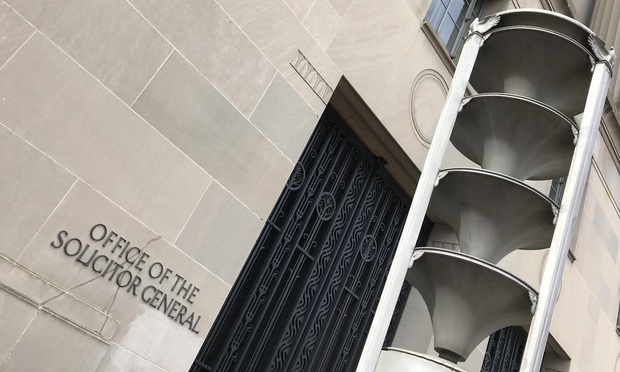 Solicitor General's Office at Main Justice in Washington. (Photo: Mike Scarcella /ALM)
Solicitor General's Office at Main Justice in Washington. (Photo: Mike Scarcella /ALM)
Health insurance providers are not entitled to billions of dollars in payments from the federal government covering losses that arose from their participation in the Affordable Care Act's online marketplaces, the U.S. Justice Department told the U.S. Supreme Court on Wednesday.
The Justice Department is asking the Supreme Court to reject challenges from providers claiming the U.S. government is on the hook for more than $12.3 billion in so-called “risk corridor” payments. Any obligation to make those payments, the government told the justices in a new filing, was voided when Congress “expressly prohibited” the Health and Human Services Department from continuing to make payments using certain funds.
The Justice Department's brief asked the Supreme Court to uphold a divided ruling from the U.S. Court of Appeals for the Federal Circuit. The Washington-based appeals court ruled 9-2 in support of the government last year.
Participating in the Affordable Care Act's exchanges presented business risks for health insurers, and the risk corridors program, operating from 2014 to 2016, was designed to use cash from thriving health plans to reimburse other health providers whose costs exceeded premiums. Numerous suits seeking money damages were filed in the Washington-based U.S. Court of Federal Claims, generating a substantial amount of litigation and uncertainty as judges there divided over whether the government had broken its promises.
“Like numerous other insurers, petitioners responded exactly as Congress intended, participating in the exchanges and charging lower premiums than they would have absent the government's commitment to share some of the risk,” lawyers for Oregon-based Moda Health Plan Inc. said in their petition in February at the Supreme Court.
Moda is represented by Kirkland & Ellis, including partner Paul Clement, who was identified as counsel of record. Moda's lawyers argued that “the net effect was a bait-and-switch of staggering dimensions in which the government has paid insurers $12 billion less than what was promised.”
Moda's attorneys argued that the Federal Circuit decision, left untouched, “provides a roadmap for the government to promise boldly, renege obscurely, and avoid both financial and political accountability for depriving private parties of billions in reliance interests.”
Clement added: “That the decision emanates from the court with exclusive jurisdiction over financial claims against the government only underscores the need for this court's review. There is no prospect of further percolation; there is only the certainty of further damage.”
Lawyers from the law firm O'Melveny & Myers filed an amicus brief on behalf of Blue Cross Blue Shield Association, which advocates for the interests of 36 locally operated companies that provide insurance to nearly 106 million people.
“Blue Plans were disproportionately injured by the government's bait-and-switch. Of the $12.3 billion in risk corridors obligations that the government has failed to pay, 40 percent—or nearly $5 billion—is owed to Blue Plans,” O'Melveny partner K. Lee Blalack II wrote in the friend-of-the-court brief.
Moda's and Blue Cross' “repeated invocations of a multibillion-dollar 'bait-and-switch' ring hollow,” the Justice Department said Wednesday. “The [Affordable Care Act] itself provided no funding for risk-corridors payments, leaving that determination to the judgment of future Congresses.”
The Health and Human Services Department “had no authority to make payments, or to commit the government to making such payments, beyond the sums (if any) Congress ultimately appropriated,” the Justice Department argued.
The Justice Department said it would've been unreasonable to expect any insurer to participate in the Affordable Care Act exchanges on the assumption that certain costs would be reimbursed given that the health care law itself did not provide funding for those subsidies and that “future Congresses might elect never to provide full or any funding.”
“It is more probable that insurers like petitioners elected to sell plans on the exchanges as a result of the powerful business incentives they had to do so,” the Justice Department said.
The Justice Department's brief is posted below:
Read more:
© 2025 ALM Global, LLC, All Rights Reserved. Request academic re-use from www.copyright.com. All other uses, submit a request to [email protected]. For more information visit Asset & Logo Licensing.








